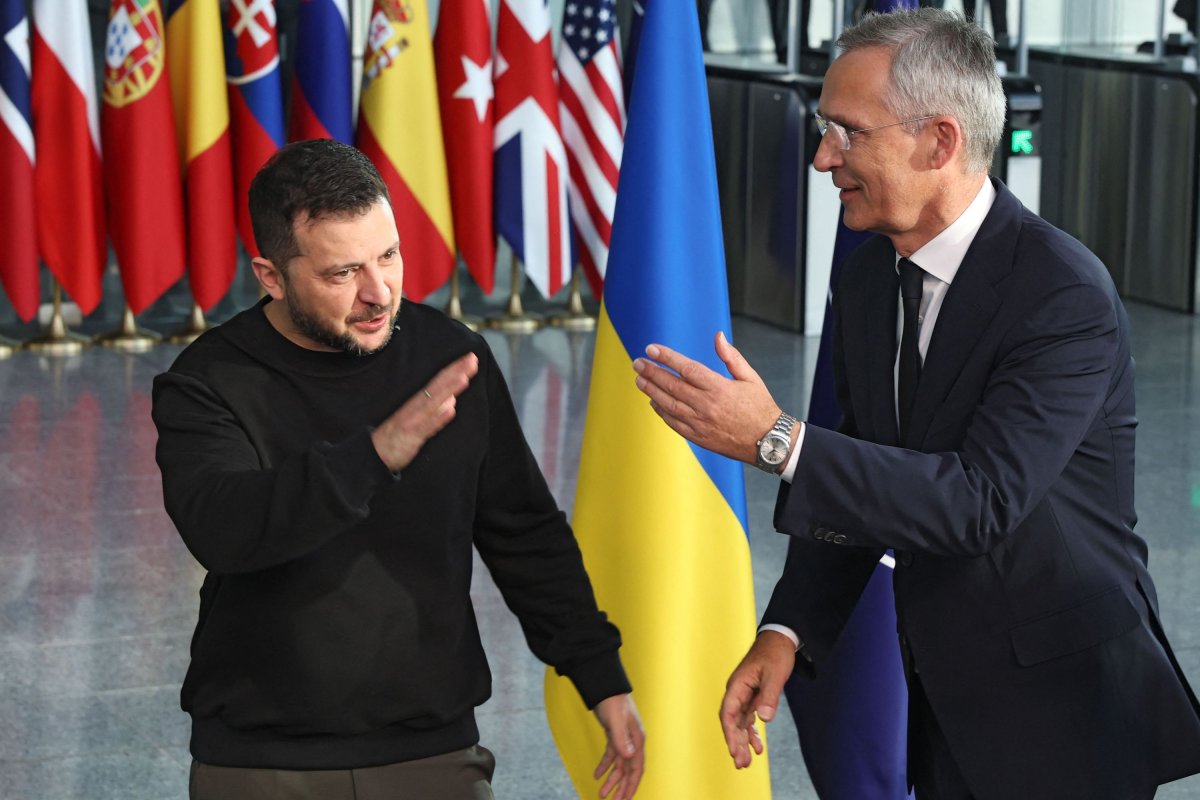As horrific events in the Middle East threaten to reduce the nearly two-year conflict in Ukraine to a forgotten front, some U.S. and European strategists have begun to revive the idea of a negotiated peace between Kyiv and Moscow.
The mere suggestion of a peace settlement remains provocative and can draw accusations of defeatism, appeasement, and noxious pro-Putin sentiment. But the reality is that such a settlement has always been the war's likeliest outcome. According to senior U.S. officials who have leaked their knowledge of recent international discussions to the media, the possibility of a settlement has now been broached in broad outline by the Ukraine Defense Contact Group, a diplomatic conference of over 50 countries that support Ukraine.
Is a negotiated peace settlement something to fear? Signs point to no—at this stage such a settlement would not result in any meaningful Russian victory. Consider Russia's goals when it invaded Ukraine in February 2022. Anticipating no serious resistance from the Ukrainians and an irresolute reaction from NATO, Moscow banked on a quick Blitzkrieg-style military victory, the installation of a pro-Russian satrapy in Kyiv, the elimination of Ukraine's political independence, and a permanent block on Ukrainian integration with the West. In other words, Russia expected to pull off the same thing it tried to achieve with respect to numerous other weak neighbors over the past three centuries. On a larger scale, Russia also hoped to expose and exploit perceived Western weaknesses in order to separate the United States from its European allies.
To President Vladimir Putin's utter humiliation, Russia has not even come close to achieving any of these goals. His invasion sputtered to stalemate within a matter of days. Ukraine's government is still led by the militantly anti-Russian Volodymyr Zelensky, who on Meet the Press this Sunday called Putin a "f***ing terrorist." Ukraine's fight for independence has produced a spirited national defense and rallied much of the world to its side. Ukraine's political and economic links to the West are stronger than they have ever been, and its protection by some form of Western security guarantee, even while still at war and with disputed borders, seems increasingly likely.
The West, meanwhile, has repaired virtually all fissures with Kyiv present before 2022, steadily supplied Ukraine with heavy and highly competitive weaponry for its defense, and expanded NATO to include Sweden and Finland—strategically important countries that in the wake of Russian aggression swiftly abandoned decades-long domestic opposition to membership in the Atlantic alliance.

As the sober analysts of the Contact Group reportedly recognize, conditions on the ground do not favor continued warfare for either party or the world at large. Just as Russia has failed to beat the Ukrainians into submission, Ukraine lacks the power to dislodge the Russians from its pre-2022 territory, still less its pre-2014 territory, the latter of which Zelensky maintains is a prerequisite to peace talks. Ukraine's much-vaunted summer offensive enjoyed only modest success and ran smack into a heavy, multilayered Russian defense in depth that has blunted further Ukrainian advances. Although U.S. national security leaders have resisted using the term "stalemate" (though, curiously, some Ukrainian leaders have not), the situation on the ground invites no other description.
Recovering the Donbas and Crimea, which are now—legally or not—integral parts of Russia is a virtual impossibility for Kyiv. But sacrificing them in a settlement only means that Ukraine would be forever rid of those regions' large ethnic Russian populations, whose pre-2014 electoral heft ensured a serious amount of Russian influence in the country. If those regions are ceded to Russia, their pro-Moscow populations will never again play any role in Ukrainian politics. Before 2014, moreover, Crimea and the Donbas were also Ukraine's poorest and least productive regions and required massive subsidies from Kyiv that are now Putin's problem, and reportedly a costly one.
Producing the stalemate in the field has already cost U.S. taxpayers some $135 billion, with another $61 billion earmarked for Ukraine in the emergency appropriations bill proposed by the Biden administration after Hamas' October 7 terrorist attack on Israel (though drafted in response to that attack, the bill allocates just $14 billion to the Israelis). Economic sanctions against Russia have had minimal effect, with Moscow proving remarkably adaptive at obtaining the technology and hardware it needs to keep fighting. Russia has seemingly faced no check on its high-value energy exports to eager consumers in China and other Eurasian markets with direct access to Russian supplies. As diplomatic rhetoric, proximity of forces, scale of armaments, and new theaters of conflict on the Eurasian periphery all increase, the risk of a general war between Russia and NATO—a possible World War III—has risen and will continue to rise.
Barring such a catastrophic global conflict and in the absence of a peace settlement, the war will almost certainly devolve to a contest of attrition, with Russia and Ukraine duking it out until Russia's vastly larger population and resource base exhaust Ukraine's capacity to resist, or until war conditions and attendant political repression produce a serious enough crisis within Russia to prevent it from continuing the war. Either scenario could take years to manifest, witness massive casualties beyond the heavy ones already suffered, and for the entire duration pose the threat of a global war with possible nuclear dimensions.
Putin is a reprehensible thug, but he will not last forever and already has major limitations that he has been made painfully aware of. It might be time to give peace a chance.
Paul du Quenoy is President of the Palm Beach Freedom Institute.
The views expressed in this article are the writer's own.
Uncommon Knowledge
Newsweek is committed to challenging conventional wisdom and finding connections in the search for common ground.
Newsweek is committed to challenging conventional wisdom and finding connections in the search for common ground.
About the writer
To read how Newsweek uses AI as a newsroom tool, Click here.






